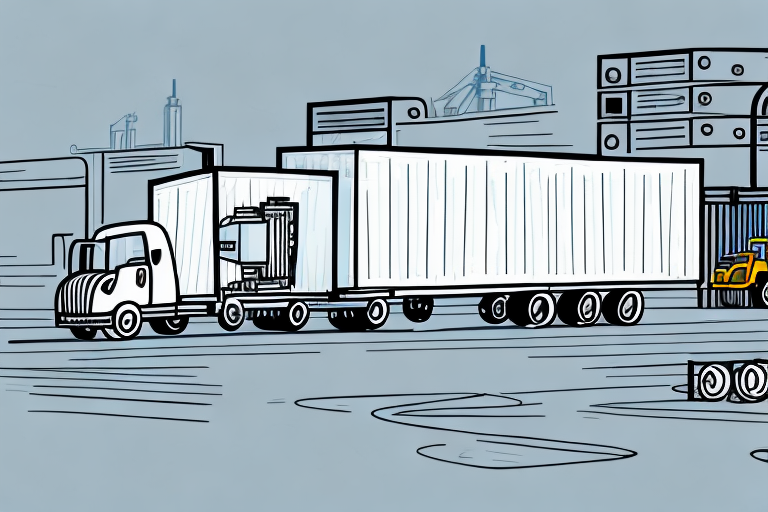What Is a 3PL Brokerage? Exploring the Benefits of Third-Party Logistics Services
In today's fast-paced and globalized world, businesses need to be agile and efficient to remain competitive. This is particularly challenging when it comes to logistics, a critical component of supply chain management. Logistics involves managing the movement and storage of goods to ensure they transition from the point of origin to the point of consumption in a timely and cost-effective manner. Third-party logistics (3PL) services have emerged as a valuable solution to help businesses streamline their logistics operations. In this article, we will delve into the fundamentals of 3PL brokerage and explore the myriad benefits it can offer to businesses of all sizes.
Understanding the Basics of 3PL Brokerage
3PL brokerage involves outsourcing logistics services to specialized third-party providers who excel in transportation, warehousing, and other related services. These companies serve as intermediaries between shippers and carriers, leveraging their expertise and extensive resource networks to optimize transportation and other logistics functions.
3PL providers offer a comprehensive range of services, including:
- Freight Forwarding: Arranging the movement of goods from one location to another, including customs clearance, documentation, and insurance.
- Transportation Management: Planning, executing, and optimizing transportation operations, such as carrier selection, rate negotiation, and tracking.
- Warehousing and Distribution: Storage and distribution of goods, including pick and pack, inventory management, and order fulfillment.
- Customs Brokerage: Managing clearance and compliance requirements for international shipments.
- Value-Added Services: Supplemental services like assembly, packaging, and labeling that enhance the logistics process.
The flexibility of 3PL brokers allows for customized services tailored to the specific needs of each client, making them an indispensable asset in modern supply chain management.
Benefits of Third-Party Logistics Services
Utilizing third-party logistics services presents several advantages for businesses:
- Cost Savings: Outsourcing logistics eliminates the capital investment required for in-house logistics infrastructure. According to a 2023 industry report by IBM, businesses can reduce logistics costs by up to 20% through 3PL partnerships.
- Improved Efficiency: Leveraging the expertise of 3PL providers leads to faster and more accurate order fulfillment, enhanced supply chain visibility, and overall operational efficiency.
- Access to Advanced Technology: 3PL providers utilize cutting-edge technologies such as Transportation Management Systems (TMS), Warehouse Management Systems (WMS), and Inventory Management Systems (IMS) to optimize logistics operations.
- Scalability: 3PL services can easily scale with your business needs, accommodating fluctuations in demand without the need for additional resources or infrastructure.
- Expertise and Focus: By outsourcing logistics, businesses can concentrate on their core competencies while relying on logistics experts to handle complex supply chain functions.
These benefits collectively contribute to enhanced customer satisfaction, reduced operational costs, and a stronger competitive edge in the market.
Types of Third-Party Logistics Services
3PL providers offer a diverse array of services to cater to various business needs:
- Transportation Management: Encompasses the planning, execution, and optimization of transportation operations, including carrier selection and rate negotiation.
- Freight Forwarding: Involves the coordination of shipments across different transportation modes and managing associated documentation and compliance.
- Warehousing and Distribution: Storage solutions coupled with distribution services such as inventory management and order fulfillment.
- Customs Brokerage: Ensures compliance with international trade regulations and manages the clearance of goods across borders.
- Value-Added Services: Additional services like assembly, packaging, labeling, and kitting that enhance the logistical process.
Specialized services are also available for specific industries. For instance, providers may offer temperature-controlled transportation for perishable goods or handle hazardous materials with the necessary safety protocols. E-commerce fulfillment services are another popular offering, managing online orders, returns, and customer service for businesses operating in the digital marketplace.
Choosing the Right 3PL Provider
Selecting an appropriate 3PL provider is critical for maximizing the benefits of outsourcing logistics. Consider the following factors when making your decision:
- Experience and Expertise: Evaluate the provider's experience in your industry and their proficiency in handling logistics challenges specific to your business.
- Technology Capabilities: Ensure the provider utilizes advanced logistics technologies such as TMS, WMS, and IMS for efficient operations and real-time visibility.
- Scalability: Choose a provider that can grow with your business and adapt to changing logistics needs.
- Geographic Coverage: Assess the provider's ability to manage logistics across the regions where your business operates.
- Customer Service: Look for providers that offer excellent customer support, transparent communication, and regular updates on shipment statuses.
- Cost Structure: Understand the pricing model of the provider to ensure it aligns with your budget and offers value for the services rendered.
Additionally, reviewing the provider's track record and seeking client testimonials can provide insights into their reliability and service quality.
Saving Time and Money with 3PL Brokerage
One of the primary advantages of 3PL brokerage is the potential for significant time and cost savings. By outsourcing logistics operations:
- Resource Optimization: Businesses can reallocate resources from logistics management to other core areas, enhancing overall productivity.
- Cost Efficiency: Leveraging the 3PL provider's economies of scale can result in lower transportation and warehousing costs.
- Enhanced Order Accuracy: 3PL providers employ advanced technologies and processes that reduce errors in order fulfillment, leading to improved customer satisfaction.
Moreover, the access to specialized expertise and technology means businesses can implement best practices without the need for substantial upfront investments. According to a Forbes article, companies that partner with 3PL providers often see a reduction in logistics costs by up to 15%, alongside improvements in delivery times and supply chain reliability.
The Role of Technology in 3PL Services
Technology is a cornerstone of modern 3PL services, enabling providers to offer efficient and scalable logistics solutions. Key technologies include:
- Transportation Management Systems (TMS): Software that helps plan, execute, and optimize transportation operations, providing real-time tracking and analytics.
- Warehouse Management Systems (WMS): Systems that manage warehouse operations, including inventory tracking, order fulfillment, and space optimization.
- Electronic Data Interchange (EDI): Facilitates the electronic exchange of business documents between organizations, enhancing communication and efficiency.
- Automation and Robotics: Automated sorting, packing, and shipping systems, along with autonomous robots for warehouse management, reduce manual labor and increase accuracy.
- Artificial Intelligence and Predictive Analytics: Utilized for forecasting demand, optimizing routes, and enhancing decision-making processes.
The integration of these technologies not only boosts operational efficiency but also provides greater transparency and visibility across the supply chain. According to a McKinsey report, the adoption of advanced technologies in logistics can improve supply chain performance by up to 25%.
Real-World Examples of Successful 3PL Implementation
Numerous businesses across various industries have successfully leveraged 3PL brokerage to enhance their logistics operations:
- Automotive Manufacturing: A leading automotive parts manufacturer partnered with a 3PL provider to streamline their supply chain. By consolidating shipments and optimizing carrier selection, they achieved a 20% reduction in logistics costs and improved delivery times.
- Medical Supplies Distribution: A distributor of medical supplies utilized 3PL services to enhance supply chain visibility. The 3PL provider implemented a robust tracking system, resulting in a 30% improvement in on-time deliveries and higher customer satisfaction rates.
- Retail E-commerce: An online retail company engaged a 3PL provider to manage inventory and order fulfillment. This partnership enabled them to scale operations during peak seasons without compromising order accuracy, leading to a 25% increase in sales.
- Food and Beverage: A food and beverage company outsourced their transportation management to a 3PL provider. The optimized routing and consolidation strategies employed by the provider resulted in a 15% decrease in transportation costs and reduced carbon footprint.
These case studies highlight the versatility and effectiveness of 3PL brokerage in driving operational excellence and achieving strategic business goals.
Common Misconceptions About Third-Party Logistics Services
Despite the evident benefits, several misconceptions surround 3PL services:
- 3PLs Are Only for Large Enterprises: Contrary to popular belief, 3PL providers offer scalable solutions suitable for businesses of all sizes, including small and medium-sized enterprises (SMEs).
- Limited Control Over Logistics: Many assume that outsourcing logistics results in a loss of control. In reality, reputable 3PL providers offer transparency and real-time monitoring, ensuring businesses retain oversight over their supply chain operations.
- High Costs: Some believe that 3PL services are prohibitively expensive. However, the cost savings from optimized operations and economies of scale often result in overall lower logistics expenses.
- One-Size-Fits-All Solutions: Another misconception is that 3PL providers offer generic services. In truth, top-tier 3PLs provide customized solutions tailored to the unique needs of each business.
Understanding the true capabilities and flexibility of 3PL providers can help businesses make informed decisions about outsourcing their logistics functions.
Future Trends in 3PL Brokerage
The logistics industry is continuously evolving, and 3PL brokerage is at the forefront of these changes. Key future trends include:
- Increased Use of Artificial Intelligence: AI will play a larger role in predictive analytics, demand forecasting, and optimizing supply chain decisions.
- Blockchain Technology: Enhancing transparency and security in supply chain transactions through decentralized ledger systems.
- Eco-Friendly Logistics: A growing emphasis on sustainability will drive 3PL providers to adopt greener practices, such as electric vehicles and sustainable packaging.
- Omnichannel Fulfillment: As consumer preferences shift towards seamless online and offline shopping experiences, 3PL providers will offer integrated omnichannel fulfillment solutions.
- Automation and Robotics: Continued advancements in automation will further streamline warehouse operations and reduce reliance on manual labor.
These trends are expected to shape the future landscape of 3PL brokerage, driving innovation and enhancing the value proposition for businesses across various industries.
Conclusion
3PL brokerage offers a strategic advantage for businesses aiming to optimize their logistics operations and enhance supply chain efficiency. By partnering with specialized 3PL providers, companies can achieve significant cost savings, improve delivery accuracy, and gain access to advanced technologies and expertise. When selecting a 3PL partner, it's essential to consider factors such as experience, technological capabilities, scalability, and customer service to ensure a successful and productive collaboration. Embracing 3PL services can empower businesses to focus on their core competencies while leveraging the strengths of logistics experts, ultimately driving growth and competitive advantage in the marketplace.



















